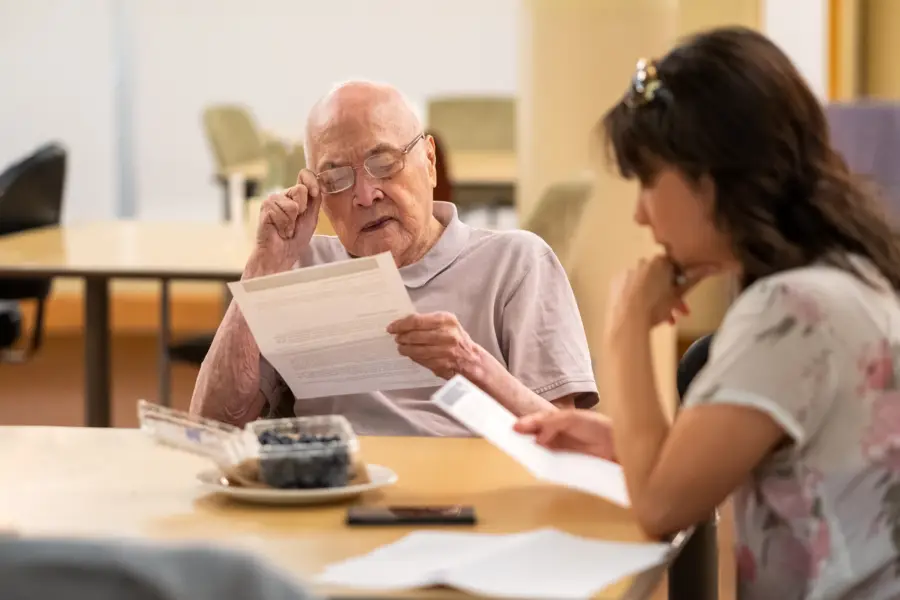
As the past few years have made abundantly clear, the future is not nearly as predictable as we might like. One of the best examples of this is our health, which can change suddenly and unexpectedly. Serious illness can happen any time and can impact all aspects of our lives. Advance planning empowers people to make their own decisions about important topics like finances, health care, and living arrangements before the need arises. Despite this, less than half of adults 65 and older have created advance directives.
For people who suspect or have been diagnosed with dementia, planning for the future takes on greater urgency. Most forms of dementia are progressive and necessitate increasing levels of support and care. Thanks to medical advancements and improved practices, diagnosis is often happening earlier, enabling people with dementia to be more involved in decisions about their future.
The National Alzheimer’s and Dementia Resource Center, funded by the Administration for Community Living, has partnered with the American Bar Association Commission on Law and Aging to update a series of advance planning guides for people living with dementia. The guides are written in plain language and are intended to support people living with dementia and their family members in knowing what to plan for and how to get started.
Key things to know about advance planning with dementia:
1. Name a health care agent and a financial agent
Most people living with dementia will eventually need support in making decisions about their health care and in managing their finances. Creating a health care power of attorney and a financial power of attorney protects the person and those they love by making it clear who can support them in making decisions if they’re not able on their own. This agent is often a family member or friend but not always. They should choose someone they trust, who understands their wishes, and who will be willing to make decisions in their best interest.
- A health care agent will have the legal right to communicate with doctors, agree to or refuse treatments, and make decisions about where care is provided.
- A financial agent will have the legal right to make decisions about money and property if the person cannot, or if they need support.
- The health care agent and financial agent may be the same person or may be different people.
- Without health care or financial powers of attorney, the state’s laws dictate who can legally make these decisions. Sometimes this isn’t who the person living with dementia would have chosen.
2. Continue to talk with the agent(s) and other family members
Once agents have been named, it’s important that they and other family members understand the person’s values and preferences about medical care and money management.
- For help with personal care (e.g., bathing, using the bathroom), would they rather have a family member or a paid provider assisting them?
- How much or little medical intervention do they want if their illness becomes advanced?
- What does quality of life mean to them?
- What are their financial priorities?
- What are the options for obtaining additional care?
These are not easy conversations, but they can ultimately bring great peace of mind to everyone involved. There are several resources for having these conversations that are included in the advance planning guides.

3. Continue to involve the person living with dementia in decisions
As the person living with dementia becomes less able to make decisions independently, they are often left out of important conversations. Health care providers may speak to the care partner rather than looking at the person directly. Family members may talk over or around the person living with dementia rather than engaging them in discussions.
However, attitudes are changing. More people are realizing that there are ways to respect the personhood of those living with dementia, in big ways and small. This can be as simple as presenting them with two choices of what to eat for breakfast, or it can be as significant as supporting the person in their decision about where to live.
Family members and providers can learn communication skills that support these conversations, and the person living with dementia’s quality of life can be meaningfully enhanced. Local dementia organizations, Area Agencies on Aging, or health care providers can often provide information about training programs in caregiving, communication, and other topics.
Help is available for advance planning for dementia
Advance planning doesn’t have to be overwhelming. The NADRC advance planning guides include straightforward action steps and multiple resources for planning, including information on the types of professionals who can help, where to find them, links to existing advance directive forms, and other useful websites and phone numbers.
Professionals in aging, elder law attorneys, dementia services providers, and consumers are encouraged to download the guides, which can be tailored to include co-branding for the organization distributing them. Putting these important advance plans in place is a great act of caring that can bring people living with dementia – and those caring for them – great peace of mind.

